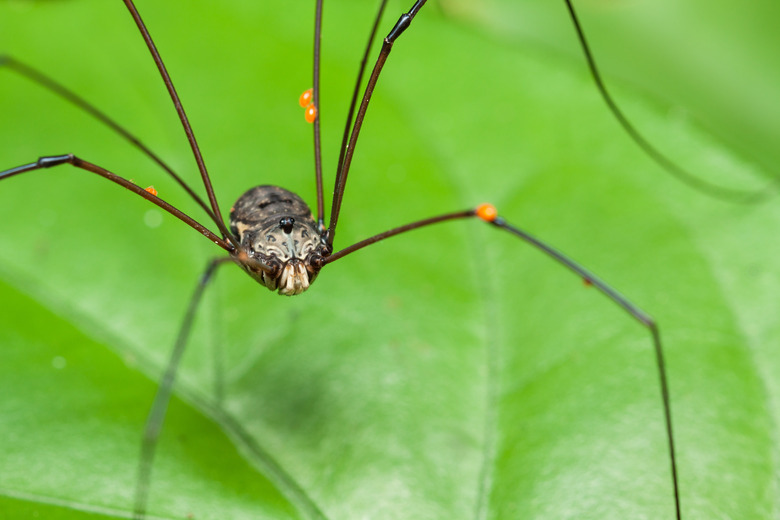Common Spiders In Massachusetts
Spiders are eight-legged organisms of the order Araneae and the class Arachnida. They are well known for spinning webs – though not all species do – and using venom injected from their fangs to kill prey. Despite the widespread fear they provoke in people, spiders are mostly harmless and beneficial to human beings, although some bite in self-defense. In Massachusetts, some of the most common and/or best-known spiders include house spiders, cellar spiders (aka "daddy long-legs"), wolf spiders and black widows. Of these, people really only need to worry about black widow bites, as their venom is especially potent, even (in rare instances) deadly.
TL;DR (Too Long; Didn't Read)
A wide variety of spiders call Massachusetts home, though many are so small or retiring that human beings rarely notice them. More conspicuous species include common house spiders, wolf spiders and cellar spiders (also called daddy long-legs); the rarely seen black widow, meanwhile, is really the only dangerously venomous spider native to the state, although bites are rare.
House Spider
House Spider
The common house spider (Parasteatoda tepidariorum), is characterized by having striped legs that are alternating tan and dark brown in color. The main torso is generally a dark brown and usually comes adorned with lighter-colored designs. As the name implies, house spiders commonly inhabit homes, especially in attics, basements and on ceilings. House spiders belong to the Theridiidae family of spiders, well known for making compact, fluffy webs in the corners of rooms and other structures.
Cellar Spiders, or "Daddy Long-Legs"
Cellar Spiders, or "Daddy Long-Legs"
Daddy long-leg spiders refers to various long-legged species of cellar spiders of the family Pholcidae, though the name also applies to the more active and easily seen arachnids called harvestmen, which aren't true spiders. Distinguished by remarkably long and thin legs and delicate bodies, cellar spiders live in tree trunks and other organic materials but also build their ragged webs in wall and ceiling corners and other tucked-away places in homes.
Wolf Spider
Wolf Spider
Members of the Lycosidae family, wolf spiders commonly intimidate people given their impressive size, hairiness and active movements, though they're essentially harmless. Their brown or gray bodies come adorned with bold stripes and other patterns. You can often find wolf spiders in or around windows, doors and houseplants, or outside in gardens and under rocks.
Black Widow
Black Widow
Northern black widow spiders may occasionally be encountered in Massachusetts, as can on rare occasions southern black widows stowed away in imported fruits and produce. Female black widows are larger and more easily recognized than males given their bulbous abdomens with the notorious red hourglass marking. Males have more elongated abdomens, and – instead of an hourglass – boast red and white designs on their sides. You're most likely to find black widows in basements and under woodpiles or other manmade structures. The severity of a black widow's bite depends on the physical condition of the bitten individual. Children and elderly individuals are more prone to serious symptoms such as chest pain, fainting, respiratory complications and elevated heart rate and blood pressure. (Another U.S. spider with potentially harmful venom, the brown recluse, is sporadically reported in Massachusetts, but isn't native here; sightings may be of recluses that hitched a ride into the state or, as is often the case, represent a case of mistaken identity.)
Cite This Article
MLA
Devaney, Erik. "Common Spiders In Massachusetts" sciencing.com, https://www.sciencing.com/common-spiders-massachusetts-6322544/. 30 April 2018.
APA
Devaney, Erik. (2018, April 30). Common Spiders In Massachusetts. sciencing.com. Retrieved from https://www.sciencing.com/common-spiders-massachusetts-6322544/
Chicago
Devaney, Erik. Common Spiders In Massachusetts last modified March 24, 2022. https://www.sciencing.com/common-spiders-massachusetts-6322544/
